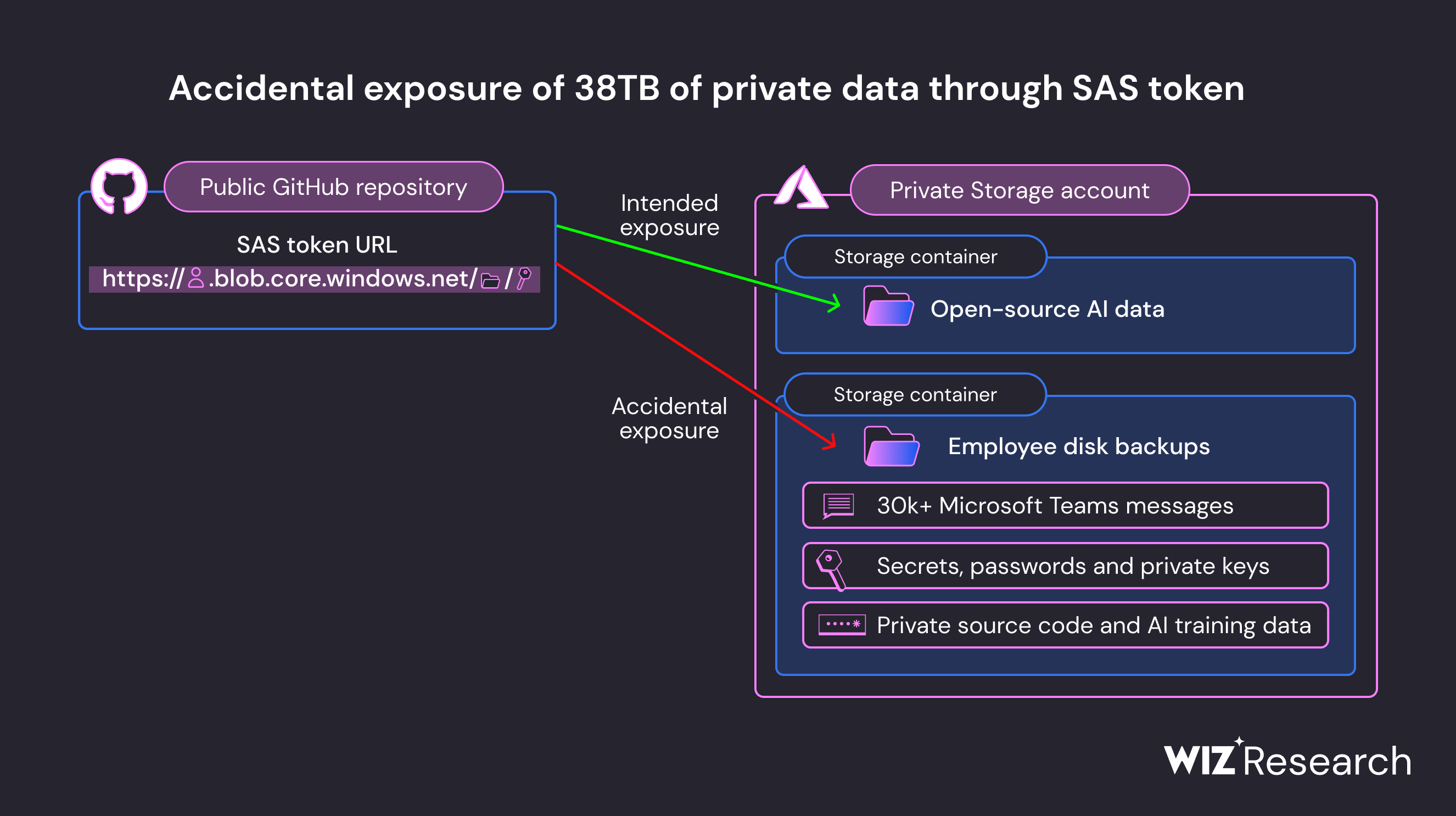Microsoft mishap leaves 38TB of private data exposed for three years
Microsoft’s blunder first occurred in 2020 and wasn’t uncovered until June this year


Up to 38TB of sensitive company information was accidentally leaked by Microsoft AI staffers due to a misconfigured Azure SAS token, according to new research.
Analysis from researchers at cloud security firm Wiz found that Microsoft’s AI research team uploaded an overly permissive URL to its GitHub repository which directed anyone to access the trove of what should be private data.
Data exposed in the mishap included full backups of two employee work devices, both of which contained data including passwords to Microsoft services, private keys, and records of more than 30,000 internal Microsoft Teams messages.
As part of its activity on the platform, Microsoft’s AI research team regularly provides links to open source training data for the community to use, but the link in question led to an Azure Storage bucket which was misconfigured, allowing access to more private data.
Researchers at the tech giant were found to have shared files using Azure Shared Access Signature (SAS) tokens, which enable users to access and share data from the service’s storage accounts.
Typically, SAS tokens prevent unauthorized users from accessing files. However, in this instance a URL to stored data was configured to grant permission to the entire account, Wiz found.
“The [Microsoft] researchers shared their files using an Azure feature called SAS tokens, which allows you to share data from Azure Storage accounts,” Wiz’s team said.
Get the ITPro daily newsletter
Sign up today and you will receive a free copy of our Future Focus 2025 report - the leading guidance on AI, cybersecurity and other IT challenges as per 700+ senior executives
“The access level can be limited to specific files only; however, in this case, the link was configured to share the entire storage account – including another 38TB of private files.”

The investigation from Wiz found that the initial mishap occurred in July 2020 and went unnoticed for nearly three years, although Wiz only made the discovery in June 2023.
Researchers informed Microsoft of the issue after making the discovery. Microsoft then conducted an investigation into the potential risk to customers.
Microsoft said in a statement this week there was no evidence that customer data was exposed. Similarly, the firm said that “no other internal services were put at risk because of the issue”.
“A researcher at Microsoft inadvertently included this SAS token in a blob store URL while contributing to open source AI learning models and provided the URL in a public GitHub repository,” Microsoft confirmed.
“There was no security issue or vulnerability within Azure Storage or the SAS token feature.”
RELATED RESOURCE

Watch this on-demand webinar and learn how multi-cloud environment accelerate network transformation initiatives
Wiz said the incident highlights the need for more robust governance and monitoring practices with regard to SAS tokens.
Researchers noted that Microsoft does not offer a “centralized way” to manage tokens, which presents security risks due to the difficulties teams may have in tracking them.
“Due to a lack of monitoring and governance, SAS tokens pose a security risk, and their usage should be as limited as possible,” Wiz said. “These tokens are very hard to track, as Microsoft does not provide a centralized way to manage them within the Azure portal.”
“In addition, these tokens can be configured to last effectively forever, with no upper limit on their expiry time. Therefore, using Account SAS tokens for external sharing is unsafe and should be avoided.”
Microsoft said the incident has prompted a reassessment of SAS token management processes.
“We are making ongoing improvements to further harden the SAS token feature and continue to evaluate the service to bolster our secure-by-default posture,” the firm said.

Ross Kelly is ITPro's News & Analysis Editor, responsible for leading the brand's news output and in-depth reporting on the latest stories from across the business technology landscape. Ross was previously a Staff Writer, during which time he developed a keen interest in cyber security, business leadership, and emerging technologies.
He graduated from Edinburgh Napier University in 2016 with a BA (Hons) in Journalism, and joined ITPro in 2022 after four years working in technology conference research.
For news pitches, you can contact Ross at ross.kelly@futurenet.com, or on Twitter and LinkedIn.
-
 Bigger salaries, more burnout: Is the CISO role in crisis?
Bigger salaries, more burnout: Is the CISO role in crisis?In-depth CISOs are more stressed than ever before – but why is this and what can be done?
By Kate O'Flaherty Published
-
 Cheap cyber crime kits can be bought on the dark web for less than $25
Cheap cyber crime kits can be bought on the dark web for less than $25News Research from NordVPN shows phishing kits are now widely available on the dark web and via messaging apps like Telegram, and are often selling for less than $25.
By Emma Woollacott Published
-
 The Wiz acquisition stakes Google's claim as the go-to hyperscaler for cloud security – now it’s up to AWS and industry vendors to react
The Wiz acquisition stakes Google's claim as the go-to hyperscaler for cloud security – now it’s up to AWS and industry vendors to reactAnalysis The Wiz acquisition could have monumental implications for the cloud security sector, with Google raising the stakes for competitors and industry vendors.
By Ross Kelly Published
-
 Microsoft’s EU data boundary project crosses the finish line
Microsoft’s EU data boundary project crosses the finish lineNews Microsoft has finalized its EU data boundary project aimed at allowing customers to store and process data in the region.
By Nicole Kobie Published
-
 Microsoft hit with £1 billion lawsuit over claims it’s “punishing UK businesses” for using competitor cloud services
Microsoft hit with £1 billion lawsuit over claims it’s “punishing UK businesses” for using competitor cloud servicesNews Customers using rival cloud services are paying too much for Windows Server, the complaint alleges
By Emma Woollacott Published
-
 Microsoft's Azure growth isn't cause for concern, analysts say
Microsoft's Azure growth isn't cause for concern, analysts sayAnalysis Azure growth has slowed slightly, but Microsoft faces bigger problems with expanding infrastructure
By George Fitzmaurice Published
-
 The Open Cloud Coalition wants to promote a more competitive European cloud market – but is there more to the group than meets the eye?
The Open Cloud Coalition wants to promote a more competitive European cloud market – but is there more to the group than meets the eye?Analysis The launch of the Open Cloud Coalition is the latest blow in a war of words between Microsoft and Google over European cloud
By Nicole Kobie Published
-
 Data center constraints pinch as Microsoft reports soaring AI demand
Data center constraints pinch as Microsoft reports soaring AI demandNews The firm’s CEO Satya Nadella remained confident that supply and demand would start matching up later in the fiscal year
By George Fitzmaurice Published
-
 Microsoft slams Google’s ‘shadow campaigns’ as feud over cloud regulation escalates
Microsoft slams Google’s ‘shadow campaigns’ as feud over cloud regulation escalatesNews Google is being accused of creating an “astroturf” organization that is driven by ulterior motives
By George Fitzmaurice Published
-
 Microsoft just announced its biggest ever investment in Italy
Microsoft just announced its biggest ever investment in ItalyNews The investment from Microsoft aims to ramp up cloud infrastructure and deliver training initiatives to upskill a million people
By Emma Woollacott Published